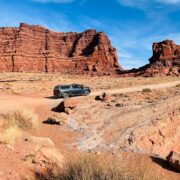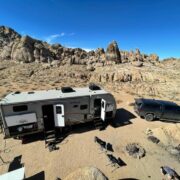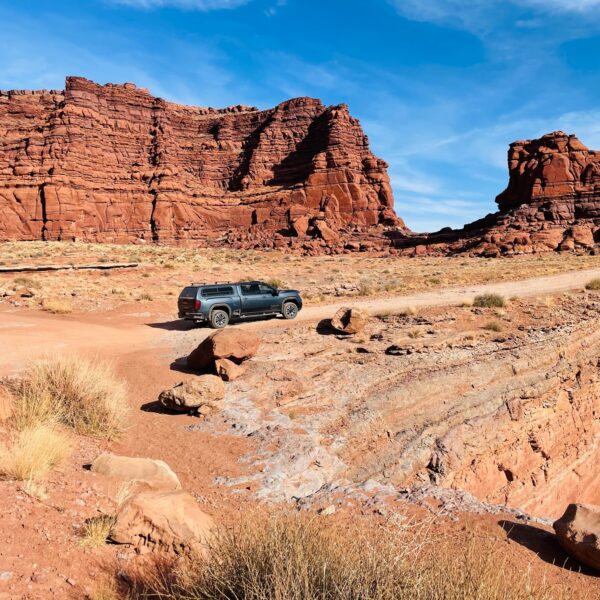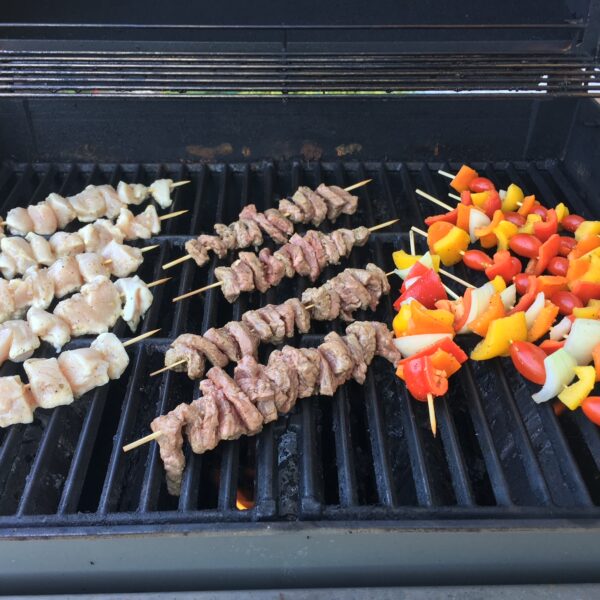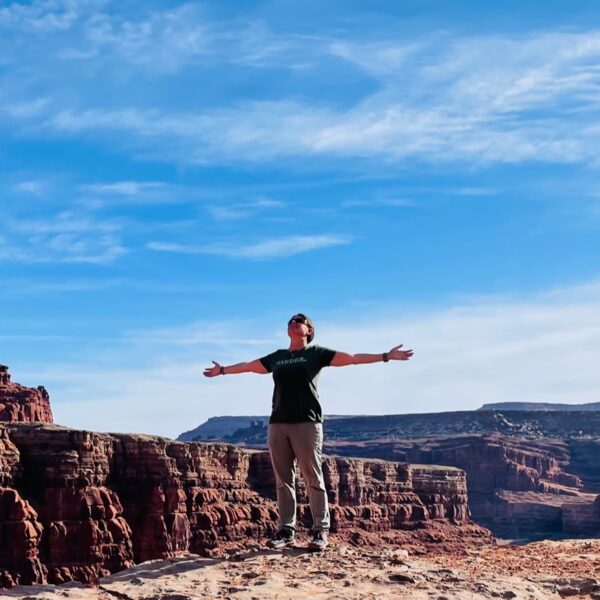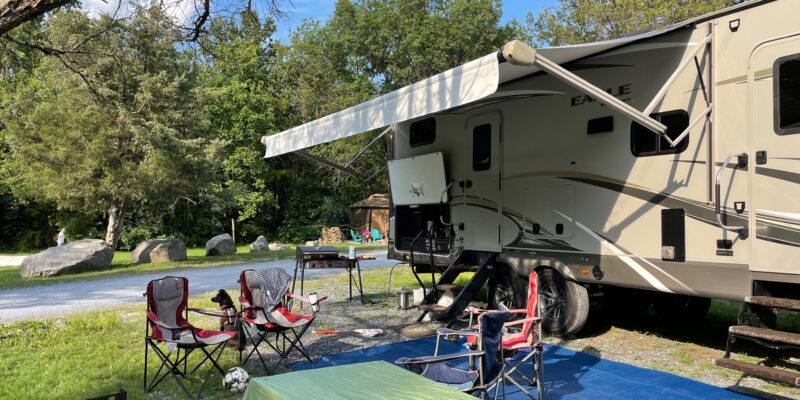
If you have the passion and desire to start RVing, consider that you may not be able to afford the perfect RV of your dreams, but you should get started with whatever RV you can afford that allows you to start this journey. It’s not unusual to trade in and upgrade after a couple years.

It can be expensive to own and maintain an RV but it doesn’t have to be. If you buy a new RV, you’ll be paying top dollar, but you won’t have as much maintenance right away. You should expect a monthly payment to finance your RV (similar to buying a car), unless you are paying cash for it. You do need additional insurance for your RV (although it may vary depending on the type of RV).
Carrying a loan for the RV will lower your barrier for entry, but it will likely cost you a bit more in the long run. It’s common knowledge that loans accrue interest (usually at a higher rate than cars). For RVs, 10-15 year loans are the normal duration. You will want to keep that in mind when looking at total interest paid. In addition, just like cars, your insurance coverage minimum will be determined by a lender (unless you avoided a loan, then its state law minimums and your preference for how well you would like to be covered). The two main extra expenses for choosing a loan are interest and insurance premiums (the option to lower your premium by having a choice to take more risk with less coverage… something a lender will not allow).
Accepting the extra expense associated with loans and turning that into a total monthly purchasing budget for your RV is a great way to start making memories now instead of waiting to save up and potentially missing the opportunity. But hey, wait for those kids to grow and move out and you don’t need as much space. Maybe that freedom and new-found lifestyle after the kids are grown is why there are so many empty-nesters with RVs. We certainly have our eyes on particular models that we’d like for that stage in our life, as we cannot imagine how difficult it would be to cram two adults and two growing boys into a smaller RV or van.
Regardless of the age of the RV (even new RVs), things often break or need adjusting and there is regular maintenance you should expect. Most things can be done yourself if you’re a little bit handy or willing to learn and follow YouTube videos. Dealerships and service stations charge more and take longer, but they’re available for those who aren’t able to do it themselves. Older RVs are generally going to need more work, but you don’t have to spend as much upfront to buy them. If you plan to do the work yourself, then buying used and allocating a repair budget could enable you to save a lot. The trade-off is time. If you can’t find the time to do the work, you will either not use the RV as much as you could have or you will have to pay to put it in the shop for repairs and those high labor rates could really eat at your savings. Putting it in a shop also usually cuts into your travel plans, as service repair stations are extremely backed up these days. Whatever rig you buy, plan to allocate an Upkeep and Repair Budget. Accounting for this when you begin your search will help prevent you from running out of funds unexpectedly or regretting your purchase, when the honeymoon phase is over.
An additional consideration is where you will be storing your RV when you are not traveling. If you don’t have the space or permission to store it outside your residence, you will need to look into storing it elsewhere. There are lots and garages for this purpose, or perhaps you can find a friend or family member with a large protected yard. We recently learned that veterans and military personnel can store RVs at some military bases for a small fee. Storage fees vary greatly around the States. If you will need to pay for storage, it’s best to do some research on the cost ahead of your purchase, to ensure it also has a budget.
Regardless of the age and type of RV, you will need to purchase some things that are necessary for RV travel (think about water, sewer, electric hook ups, wheel chocks, etc.), and some basic bedding, towels, and toiletries. You can spend a lot to outfit your RV but you don’t have to. Some items are essential, others add convenience. The amount of gear you purchase for your new RV (or new to you) will also depend on your planned use. More adventurous or diverse travels and greater lengths of time will likely end up with you leaning toward extra gear. If you are thrifty, you may be able to find a lot of the kitchen and houseware items relatively inexpensively. There are some specialty items that may be hard to find at yard sales or thrift shops, but you can always keep an eye out.
If you are buying a used RV, consider negotiating with the seller to include all the kitchen, bath, and bedding loaded in the RV. You may pay a little more up front, but it’ll probably be less than buying everything new. Remember that when looking at a used RV for sale, you should expect that base price to only include what would have come with it from the dealer. This means pretty much only things that are mounted in place. An example would be to not expect a countertop appliance to be included, but if a microwave is mounted into the cabinets it should be included. There is no harm in asking these details while shopping and negotiating your final price. Again, this should be something you plan for in your purchasing budget.
Another big expense is the cost of your overnight reservations. The cost of nightly reservations can add up if you are staying at private campgrounds, but you can often find less expensive options if you are staying at state parks, national parks, or boondocking. You can also save money if you are planning to stay in one place for several weeks or months at a time by getting long-term rates. A weekly rate can generally save you a night of fees and a monthly rate can sometimes save a week or more of nightly fees. Not all campgrounds or RV parks offer a duration discount. Most State and National run campground have a limit varying from 14-21 consecutive days. Some will even require you to leave the park system for a set amount of time prior to being able to come back (if you have maxed your stay).
Many people assume that those who choose to RV for vacations are doing so because it is cheap. It can be less expensive than hotels or renting condos/houses… but it can be more. Remember, RVers also have to purchase their dwelling and spend more on fuel to move it from place to place. Then they often pay for a campsite. While budgeting for nightly fees is not really a factor when creating a purchasing budget, You should explore them to get an idea for how much your vacations or trips will really cost. Some small and run down campgrounds might be half the cost of a big-name RV park, but they usually offer less and are less convenient to get to. State and National Parks are usually less expensive as well, and you often get a bigger and more scenic site. But, they don’t often offer full hookups and may not be as convenient as a thru stop. As an RVer, you have choices.
When we bought our RV, the dealership offered us a one-year membership to Thousand Trails. Without this offer, we probably wouldn’t have known to look into it further, but joining Thousand Trails may be very worthwhile for someone who is full-timing and open to staying in locations that are sometimes slightly away from the high-traffic areas but are in some very beautiful places around the country. You should look at the map to see if you live in or will be traveling to the regions with high density of campground locations first, to see if this is an option. If so, you may want to look into the cost of the membership compared to the number of nights you would need to stay “for free” to make it worthwhile. During the one year we had the membership, we did stay at Thousand Trails campgrounds several times, and we even upgraded to purchase an additional western region to access additional sites.

Another option to consider, depending on how you travel, is to join Harvest Host and Boondockers Welcome (in 2021 Boondockers Welcome was acquired and rolled into HarvestHost). For about $100 per year, you can stay at thousands of different wineries, breweries, farms, and other businesses, plus Boondockers Welcome offers the opportunity to stay on personal property all over the country. To thank your host, you do want to plan to patronize their establishment or make a purchase to support their small business, but that is usually still cheaper than a standard campground. Although rare, you will sometimes find hookups in these situations. One of the main rules for your RV being qualified is that you do need to be self-contained (basically, you have a bathroom on-board). You will also want to be comfortable with dry-camping, and open to a different camping experience.
The recurring theme is this: Your best plan of action is to do your research and create a budget. Without one, owning an RV will definitely cost a lot more than you expect. Budgets can also keep you from an impulse decision on a glamorous RV that you can only afford to have parked in your driveway year round. Creating a good budget and making an informed purchase decision should alleviate most pitfalls and help balance expectations. Realistic expectations create happy RVers. Happy RVers feel good about their purchase, love their RV and use it far more often than those who bought an RV without due diligence.


